Ontario Parks is dedicated to meeting the following four objectives, while maintaining or enhancing ecological integrity:
- protection of natural and cultural features,
- provision of ecologically sustainable outdoor recreation,
- natural and cultural heritage education and
- fostering research.
In many cases, protecting and restoring ecological integrity means leaving nature alone. By limiting our use of parks to low impact ecologically sustainable recreation, we can enjoy the outdoors and keep the environment healthy too.
There are times and places where we need to step in and ‘help’ the ecosystem heal from past uses, invasive species, and over-use. Below are some great stories on how Ontario Parks is protecting and restoring ecological integrity through action, monitoring and research.
Protection
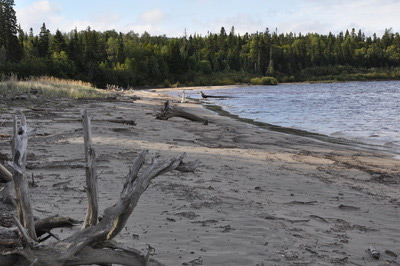
Messy beach
Great Lakes coastal beaches are in high demand, from both wildlife and human visitors. Ontario Parks takes a balanced approach to beach management, by leaving the majority of woody material (called ‘wrack’) that gets deposited by waves on the beach. This provides food and shelter for wildlife, while allowing park visitors to experience the natural beauty of Ontario’s Great Lakes shoreline.

Fire can be a good thing
Many ecosystems need fire to stay healthy. Ontario Parks and Ministry of Natural Resources & Forestry staff regularly ignite controlled low-intensity fires, called prescribed burns, to keep ecosystems (like this tallgrass prairie) healthy. Read about prescribed burning in other protected areas!

Plover guardians
Each year, volunteers gather at Wasaga Beach Provincial Park, to monitor endangered Piping Plover nesting habitat, watch for paired plovers, eggs and hatchlings, as well as educate beach goers about these endangered shorebirds. Learn more about Piping Plovers and the Wasaga Beach Plover Guardian Program!
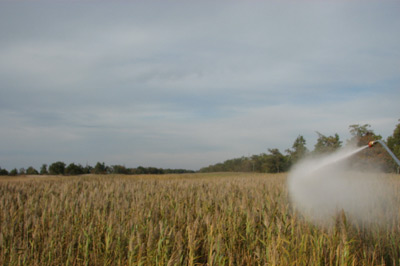
Invasive species
The invasive Common Reed (also called Phragmites australis) destroys the diversity of wetlands by crowding out other plants and animals. Ontario Parks has been battling this destructive plant through an intensive program involving pesticide application, Phragmites rolling and prescribed burning.
Additional Reading
- Road to Conservation - September 19, 2014
- American Eels in Voyageur - September 17, 2014
- The Amazing but Common Snake of Ontario - September 8, 2014
- Help to Stop an Invader - July 23, 2014
Ecologically Sustainable Outdoor Recreation

Room with a view and more
Campsites within provincial parks have been carefully sited to provide park visitors with outstanding views and experiences in nature, while avoiding impacts to natural and cultural resources.
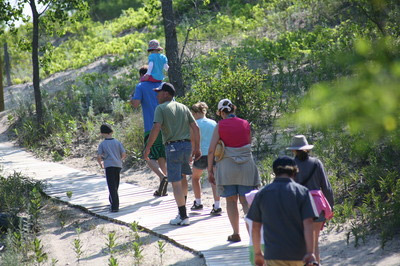
On the boardwalk
One of the highlights of visiting Ontario Parks along the Great Lakes coast is taking a trip down to one of the many sandy beaches. Due to the sensitivity of coastal beach and dune ecosystems to human foot traffic, Ontario Parks is taking measures, including installing boardwalks and other structures, to provide easy access to our beaches while minimizing impacts to the coastal dunes.

Happy trails
Ontario Parks has a variety of trail experiences to offer park visitors, across all seasons. Park trails are placed in areas that offer high quality experiences in nature, while avoiding or minimizing impacts to more sensitive areas within those parks.

Leave no trace
Canoeing or kayaking provides a great opportunity to get up close and personal with nature, while minimizing recreational impacts. Ontario Parks’ visitors are excellent at remembering to pack out what they bring in and respecting the natural and cultural features that our parks offer!

Trash your worms
The use of worms and live bait can spread invasive species that harm the health of lakes and forests and can damage fishing opportunities for future generations. Never, ever release live bait or worms into a natural area. The best place to dispose of your leftover live bait or worms is the garbage.
Education
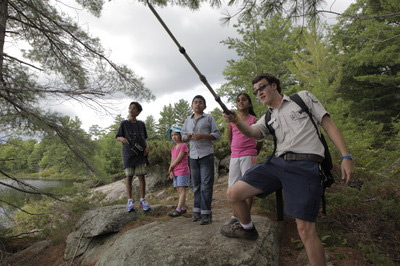
Nature programs
Ontario Parks offers a wide variety of interpretive programs across Ontario, designed to meet the interests of park users ages 5 to 95. Look for program advertisements or ask park staff for more information on specific park programs.
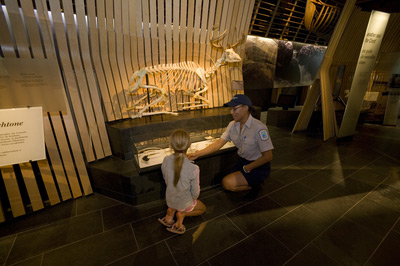
Nature Centres
Many Ontario Parks have world class education centres open to the public with wildlife displays, information on the natural and cultural resources of their park, access to park naturalists, and more!

Expert speakers
Ontario Parks is pleased to welcome a number of guest speakers and organizations into our parks each year, to help raise awareness about Ontario’s natural and cultural heritage.
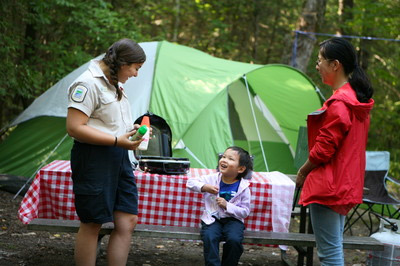
Learn To Camp
Ontario Parks offers its award winning “Learn to Camp” program that has helped over 35,000 people discover the joy of camping in a safe and fun environment. For more information, visit our Learn to Camp page.
Research
Have a research idea related to EI?
You can apply to do research in Ontario Parks, the begin the application process, go to www.ontario.ca for more information on our application to conduct research process.

Tracking turtles
Researchers from the Kawartha Turtle Trauma Centre track Blanding’s turtle movements to understand how they use park habitats. More information...
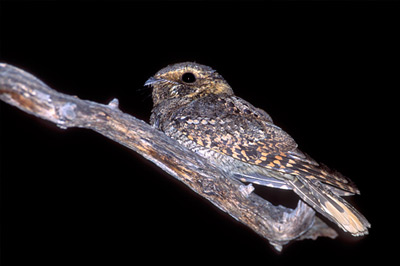
Whip-poor-will behaviour in forests
Ontario Parks, Bird Studies Canada and The Friends of Algonquin are examining how whip-poor-wills use habitat created by various forestry prescriptions in Algonquin Provincial Park. More information...

White-tailed deer and forest ecosystems
Ontario Parks and researchers from the University of Toronto have studied the effects of White-tailed deer within provincial parks. View publications on deer and forest ecosystems!

Long term monitoring
Ontario Parks is in the process of implementing a long-term monitoring program across its network of parks, as part of the Ontario Parks Inventory & Monitoring Program (OPIAM). The information collected through this program provides baseline data for a variety of purposes including the planning and management of parks and protected areas.
